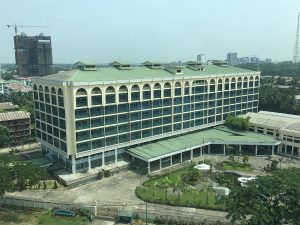Myanmar’s economy and banking system have been on life support since the destabilizing military coup of February 1. The World Bank has forecast the Myanmar economy to contract by 10 percent this year as a result of post-coup turmoil, a gloomy picture that is further darkened by the fact that an estimated 600,000 people have lost their jobs since the takeover.
The garment sector, a major contributor to the country’s economy and a key source of export earnings, has been critically affected. Several foreign brands have halted their orders and most operations are at a standstill. United Nations agencies have warned of impending food shortages and increased poverty if the crisis continues, to say nothing of the lurking threat of the COVID-19 pandemic. To add to the country’s economic woes, the public trust in the national banking system has disappeared as both people and businesses are desperately trying to hedge their finances in a fast-deteriorating economy.
The banking crisis had been the most striking illustration of the economic challenges facing Myanmar’s new military government, known officially as the State Administration Council (SAC). The anti-coup movement has succeeded in disrupting banking services for nearly three months, owing to the absence of most of the bank staff in support of the ongoing Civil Disobedience Movement. International trade has also been severely affected because banks are not in a position to clear import/export documents. Payments of social welfare schemes and salary payrolls of companies through banks are likewise paralyzed.
Rumors of a banking collapse have been afloat since the February coup. The situation has been further aggravated by the SAC’s decision to shut down mobile data, public WiFi and fixed wireless internet services to subdue the resistance, leaving the people heavily reliant on cash transactions. Long queues in front of ATM counters have become a common sight in the country over the past few weeks. To prevent a run on the banks, the junta was forced on March 1 to fix a cap on daily ATM cash withdrawals of 500,000 kyats per customer.
Though many banks had opened their doors by late April, cash shortages remain a pressing threat to the economy. The scramble for cash withdrawals only intensified after the reopening of the banks, with virtually nobody turning up to deposit money. Even the reduced withdrawal limits are not being permitted by most banks. Limits have been fixed according to the numbers of customers appearing at a bank branch on any given day, and ATMs have quickly run out of money. Individuals and even businesses have to wait for many hours at bank branches and ATMs for their daily requirement of cash. The neediest turn to the black market for cash in exchange for heavy commissions. Practices like transferring cash to multiple third-party accounts to overcome the daily withdrawal limits are also in vogue.
The fall in the value of the kyat has also contributed to the cash crunch. Myanmar’s currency has fallen nearly 20 percent against the U.S. dollar since the coup, from 1,350 at the end of January to 1,600 at the end of April. People are aggressively exchanging their kyat for gold or U.S. dollars as a hedge against the depreciating currency.
Reports from the country suggest that the Central Bank of Myanmar (CBM) is finding it increasingly difficult to provide the private banks with enough cash to cover the daily withdrawals. The CBM has already initiated various measures to instill confidence in the banking system, reiterating that the public should trust the banks and assuring people that there is no cause for worry. Banks have issued special schemes and opened new counters to woo depositors. The public has been offered new accounts with better interest rates and unlimited withdrawal limits. So far, these announcements have made little impact on the public mood, given the widespread lack of confidence in the military government.
Experts forecast a dire situation if the crisis continues without respite. Although groceries and essentials are available in the markets for the moment, the latest reports from the country show that farmers and traders are beginning to feel the squeeze. Financial indicators point towards rising inflation over the coming year, and analysts say that farmers will be in short of credit before the next planting season in June, with likely effects on the country’s food supply. Cash shortages are causing blockages in commercial supply chains and the supply of essential commodities could well be disrupted in the near future.
What Myanmar faces now, above all, is a crisis of confidence in the present administration. Widespread participation in the protests and Civil Disobedience Movement have forced the military to intensify its crackdown on the anti-coup resistance. As the SAC struggles to consolidate its power, armed resistance by ethnic rebel groups has raised fears of intensified civil war in the frontier provinces. The military coup has destroyed the public trust in the country’s democratic and financial institutions. All the more, it has pushed its banking system, and the economy as a whole, to the verge of collapse.

































